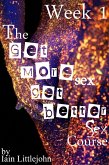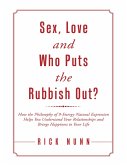Studies in the Psychology of Sex, Volume 1 Havelock Ellis - be necessary prolegomena to that analysis of the sexual instinct which must form the chief part of an investigation into the psychology of sex. The first sketches the main outlines of a complex emotional state which is of fundamental importance in sexual psychology; the second, by bringing together evidence from widely different regions, suggests a tentative explanation of facts that are still imperfectly known; the third attempts to show that even in fields where we assume our knowledge to be adequate a broader view of the phenomena teaches us to suspend judgment and to adopt a more cautious attitude.
Dieser Download kann aus rechtlichen Gründen nur mit Rechnungsadresse in A, B, BG, CY, CZ, D, DK, EW, E, FIN, F, GR, H, IRL, I, LT, L, LR, M, NL, PL, P, R, S, SLO, SK ausgeliefert werden.









